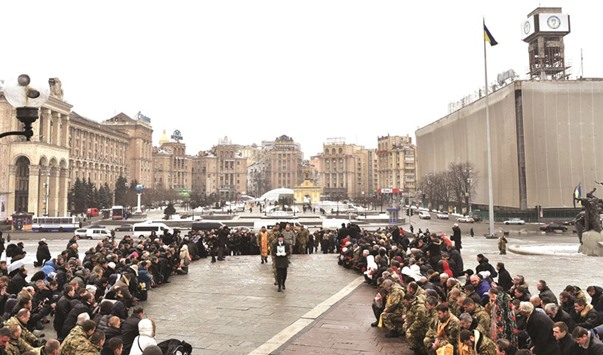Clashes between Ukrainian forces and Moscow-backed rebels left two more dead in a flashpoint town yesterday and seven others elsewhere in bloodshed that has prompted the US to condemn Russia’s “aggressive” stance.
The latest reports from both sides take the death toll in fighting since Sunday in the eastern war zone to 34 – a level not seen since the height of the war in eastern Ukraine in 2014 and 2015.
The US criticism of Moscow will be welcomed in Kiev since it is particularly worried about losing Washington’s support as new President Donald Trump seeks to mend ties with Russia’s Vladimir Putin.
Ukrainian forces and the rebels have been exchanging mortar and rocket fire near the front line town of Avdiivka just north of the pro-Russian rebels’ de facto capital of Donetsk.
The Ukrainian army said the latest fatal victims were a local woman and an emergency worker in Avdiivka.
The toll in the blue-collar town where a coke plant employs almost the entire population of 25,000 now stands at 27.
Authorities said that five soldiers were killed in other parts of eastern Ukraine where a pro-Russian insurgency has raged since April 2014.
The rebels said that shelling by the Ukrainian army also killed two civilians in Donetsk.
Ukraine and Russia have traded blame over who started the violence and who was responsible for the deaths.
AFP reporters in Avdiivka said yesterday that the shelling had died down considerably in the town itself and that only sporadic echoes of mortar fire could be heard on its outskirts.
The separatists’ sudden assault came after a month-long spell of relative calm in the 33-month war and has sharpened the world’s focus on the bloodshed in the European Union’s back yard.
The conflict began less than two months after Ukraine ousted its Russian-back leader in February 2014.
Moscow responded by annexing Ukraine’s Crimea peninsula in March 2014 before allegedly plotting the eastern insurgency to keep Ukraine under its thumb after its tilt toward the West.
The Kremlin sees most of the former Soviet Union as part of its geopolitical sphere of influence – a stance strongly disputed by the United States and European leaders such as German Chancellor Angela Merkel.
The United States’ UN ambassador Nikki Haley on Thursday condemned Russia’s “aggressive actions” in Ukraine.
But Russian President Vladimir Putin’s spokesman Dmitry Peskov countered that “without question, we dispute (Haley’s) position”.
Peskov said Moscow continues “to coherently explain our own position to all members of the UN Security Council and our other partners, including the permanent representative from the United States”.
The Avdiivka shelling left nearly 20,000 people without heating or electricity in freezing weather.
The town now has access to some water but with the pressure too weak to make it accessible in the higher floors of tall buildings.
The United States also said it would not lift sanctions against Russia – as many in Kiev feared it would do under Trump – until the Kremlin returned Crimea to Ukraine.
The Black Sea peninsula of some 2mn people is home to a Tsarist-era Russian naval base and is the bulwark of what Moscow sees as Nato’s aggression in eastern Europe.
Ukrainian President Petro Poroshenko has vowed to win back Crimea but has never said how this would be achieved.
The possibility of Russia giving up the region of its own volition seems extremely remote.
Negotiators from Ukraine and Russia as well as the rebels agreed in the Belarusian capital Minsk on Wednesday to withdraw heavy weapons from the front by tomorrow.
The deal suggests that the Avdiivka violence may soon wane.

People kneel during obsequies on Kiev’s Independence Square as servicemen carry a coffin with the body of a Ukrainian soldier who died during fighting in the eastern Ukrainian town of Avdiivka.
